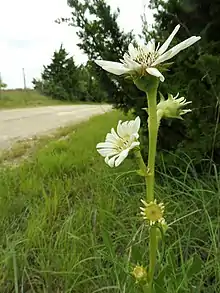Silphium albiflorum
Silphium albiflorum, commonly known as white rosinweed,[1] is a species of flowering plant in the family Asteraceae. It is native to the United States, where it is endemic to the state of Texas.[2] Its natural habitat is in open, calcareous prairies.[3][4]
| Silphium albiflorum | |
|---|---|
 | |
| Scientific classification | |
| Kingdom: | Plantae |
| Clade: | Tracheophytes |
| Clade: | Angiosperms |
| Clade: | Eudicots |
| Clade: | Asterids |
| Order: | Asterales |
| Family: | Asteraceae |
| Genus: | Silphium |
| Species: | S. albiflorum |
| Binomial name | |
| Silphium albiflorum | |
It is a tall perennial with rigid, deeply divided leaves. It produces heads of white flowers in late spring through mid-summer.[3] It is a slow growing, but extremely long-lived plant.[5]
Due to its narrow habitat requirements and low population recruitment, it is considered to be a highly conservative species. It fares poorly in areas of suburban development, and faces significant threats in parts of its range.[6]
References
- USDA, NRCS (n.d.). "Silphium albiflorum". The PLANTS Database (plants.usda.gov). Greensboro, North Carolina: National Plant Data Team. Retrieved 29 January 2018.
- "Silphium albiflorum". County-level distribution map from the North American Plant Atlas (NAPA). Biota of North America Program (BONAP). 2014. Retrieved 29 January 2018.
- Diggs, George; Lipscomb, Barney; O'Kennon, Robert (1999). Flora of North Central Texas. Botanical Research Institute of Texas. p. 404.
- Silphium albiflorum Flora of North America
- Silphium albiflorum Lady Bird Johnson Wildflower Center
- Arreola, Maria; Coronado, Patricia; Hendee, Alex; Kirkpatrick, Morgan; Nadolski, Sophie; Saheb, Fauz; Self, Stefan; Sharif, Yasmine; Trammell, Philip; Benz, Benz (2015). "Viability of Silphium albiflorum in Tarrant County" (PDF). Post Oak & Prairie Journal. 1 (3): 14–18.
This article is issued from Wikipedia. The text is licensed under Creative Commons - Attribution - Sharealike. Additional terms may apply for the media files.